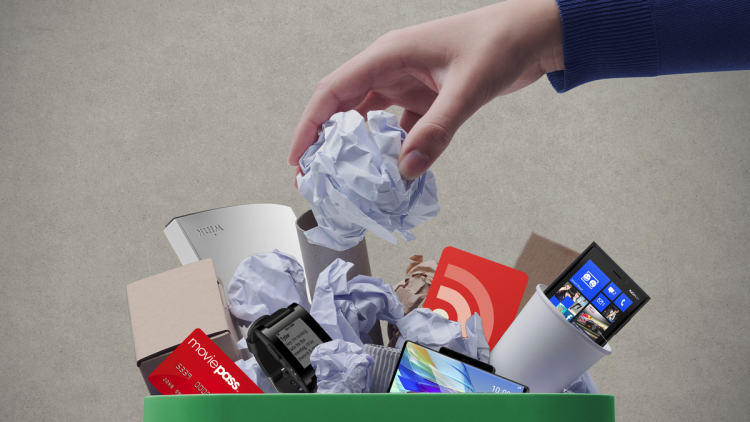Stokkete / Shutterstock.com (Modified)
Business is a game of winners and losers. And unfortunately, some of our most-loved tech products end up on the “loser” list. After decades of watching products meet their demise, it’s time to highlight the most disappointing downfalls of modern technology.
Microsoft’s Fitness Tracker
 Microsoft
Microsoft
Let’s start with something weird. During its awkward “Metro” years, Microsoft launched a fitness tracker called the Microsoft Band. And it was an impressive product for the time, offering smart features like Cortana voice assistant functionality, integration with Microsoft services (Health, Calendar, Outlook), and a design that falls flatly between “cool” and “dorky.”
At just $199, the Microsoft Band had a lot of potential. But it launched in October of 2014, just half a year before the first Apple Watch. The subsequent Microsoft Band 2 received hardly any fanfare when it arrived in late 2015.
Microsoft stopped selling its fitness band in 2016 or 2017. We’re not sure how many units the company sold, but it offered a $175 refund to remaining users after shutting down Microsoft Band services in 2019.
Noveto’s Bizarre “Invisible Headphones”

Out of all the products we saw at CES 2022, the Noveto N1 speaker left the biggest impression. This Kickstarter-funded desktop speaker uses beamforming technology to create a silent bubble of audio around your ears. Basically, it’s a pair of invisible headphones.
But Noveto slipped into insolvency shortly after CES 2022. It’s out of money, it hasn’t fulfilled a single Kickstarter order, and unless a rival company comes along for an acquisition, the Noveto N1 will never come out.
We’re bummed out by Noveto’s failure, but in a way, we shouldn’t be surprised. This company managed to burn through tens of millions of dollars in just a year. Check out our full writeup on Noveto’s failure if you enjoy a tragedy.
The SmartDry Laundry Sensor
 Josh Hendrickson / Review Geek
Josh Hendrickson / Review Geek
I have two problems with laundry—first, I always forget that I’m doing laundry. And second, my dryer’s moisture sensor is a hunk of garbage, so I have to constantly check my clothes and see when they’re dry.
A cheap product called SmartDry solved these problems. It’s just a moisture sensor that uses your smartphone or voice assistant to tell you when laundry is dry. But man, SmartDry works really well, and it can save you from over-drying your clothes and wasting electricity. We rated it a 9/10 in our review!
But SmartDry and its parent company, Connected Life, are out to pasture. These sensors will stop working on September 30th of 2022. Shut up, I’m not crying.
LG’s Weird and Wacky Smartphones
Play Video
We didn’t appreciate LG’s phones enough. Out of all the boring phone companies, LG made some of the wackiest and most innovative Android phones of all time. Products like the swivel-screen LG Wing, the dual-screen V60 ThinQ, and an unreleased foldable were just the tip of the iceberg for LG.
Our friends at LG gave up smartphones to make indoor gardening equipment. But for what it’s worth, LG offered three years of updates for its discontinued phones. That’s better service than you get from companies that continue to make new phones!
Automatic’s Smart Add-On for Dumb Cars
 Automatic
Automatic
Turning a “dumb car” into a “smart car” sounds like a monumental task. But just a few years ago, you could get the job done with a cheap OBD-II add-on. The Automatic smart adapter unlocked features like GPS tracking, collision detection, and mileage tracking to see how much you spend on gas during trips.
The Automatic adapter was truly excellent. It even had a cool app that could notify you of any issues with your vehicle or remind you where you parked. But after Sirius XM bought Automatic in 2017, it just went downhill.
Automatic went out of service in 2020 due to the COVID-19 pandemic. At least, that’s the excuse. It seems that Sirius XM lacked a real interest in the product, as quality slowly declined in the years before 2020.
Pebble, the Original Smartwatch
 Pebble
Pebble
Before the Apple Watch, we had the Pebble. Not only was Pebble the “first smartwatch,” but it was the first project to generate tens of millions of dollars on Kickstarter. Heck, three models of the Pebble watch still rank among Kickstarter’s most-funded projects.
Pebble did all the basic smartwatch stuff we enjoy today. But more importantly, it had a weeklong battery life thanks to its E Ink display. No modern smartwatches, save for the Fitbit, can match the humble Pebble’s battery life.
The original Pebble launched in 2013, two years ahead of the Apple Watch. Our sister site, How-to Geek, wrote a very nice review of the Pebble in 2016, highlighting its smart home integrations and valuable price point. But Pebble shut down later that year—our review didn’t really help, I guess.
We’d Do Anything for a Windows Phone
 Roman Pyshchyk / Shutterstock.com
Roman Pyshchyk / Shutterstock.com
Are we giving Microsoft too much love? Oh well, the Windows Phone deserves its flowers. For a brief few years, Microsoft offered a third option for smartphone buyers caught between Android and iOS. And it was a glorious few years, minus the poor app selection.
The Windows Phone was doomed for failure. But it introduced several features before Android or iOS, including a dark mode, apps as widgets (in the form of Live Tiles), and a native song-identifying feature.
Oh, and Windows Phone hardware was excellent—Nokia Lumia devices were built like bricks and had amazing cameras, relative to competing products, at least. Plus, Lumia phones gained wireless charging in 2015, two years before the iPhone. (Nokia Lumia devices would also bore a hole into your pocket because they had such sharp, crispy corners. Windows Phone loses some points for that.)
But Windows Phone managed to die off fairly quickly. Basically, Microsoft found itself in a feedback loop; Windows Phone lacked a large user base, so app developers avoided the platform. And without important apps like Instagram and Snapchat, customers wouldn’t buy Windows Phone.
The Original MoviePass
When’s the last time you stopped to think about 2018? It was one of the weirdest years of our lifetime, and oddly enough, MoviePass manages to encompass that weirdness. Here’s the gist—some dude convinced theaters that a $10 monthly subscription for unlimited movies could turn a profit.
MoviePass was not a profitable venture. Corporate dorks assumed that people would only use it to watch one or two movies a month. Yeah, right.
Shortly after launching its $10 monthly plan, MoviePass was forced to destroy itself. Movie theaters wanted to increase attendance, and ironically, their biggest boost in customers was unprofitable.
Today, MoviePass is relaunching as a privacy-fueled crypto nightmare. It probably won’t last.
Google Reader, or Whatever Google App You Loved
 Google
Google
The list of good products killed by Google deserves its own article. But for now, we’ll highlight Google Reader. It was an excellent little RSS app with a traditional “inbox” styled layout—mostly text, no oversized images or wonky design quirks. It was also free, and it lacked any of the stupid “learning” algorithms that modern alternatives force down users’ throats.
But after years of neglect, Google Reader died in 2013. People lost their decade-old RSS feeds to this shutdown, and they were forced to either give up on RSS or move to a service like Feedly. It seems that Google killed Reader in favor of algorithmic aggregators, such as the modern Google Discover page (which seems hell-bent on showing crap that you don’t care about).
Now, maybe you think that the days of RSS are over. After all, they don’t stick those little orange buttons on websites anymore. But I still use RSS every day as an editor at Review Geek. And let me tell you, I’d kill for something simple like Google Reader.
Dishonorable Mention: Wink Smart Home Hubs
 Josh Hendrickson / Review Geek
Josh Hendrickson / Review Geek
Some failed products just won’t die. Wink used to be one of the very best smart home hubs, offering excellent service and functionality in a reasonably-priced package. But it’s practically a zombie these days.
The problems started in 2015, when Wink’s original owner (called Quirky) bankrupted itself throwing money into R&D. Wink was then passed on to Flex before ending up in the hands of Will.i.am’s company, the creatively-named i.am.plus.
Wink now charges a monthly fee and doesn’t make new products. And every 30 days, customers cross their fingers in hope that Wink actually pays its bills. The company has experienced several unannounced sever outages, which last for several weeks at a time and always seem to fall on the first of the month.
We’re not sure how Wink is still in business. It treats customers like garbage and has one of the worst track records of any smart home company. Maybe we should wait for Wink to die before we put it on this list, but hey, there are zero signs of improvement from this brand.
Source by www.reviewgeek.com




























